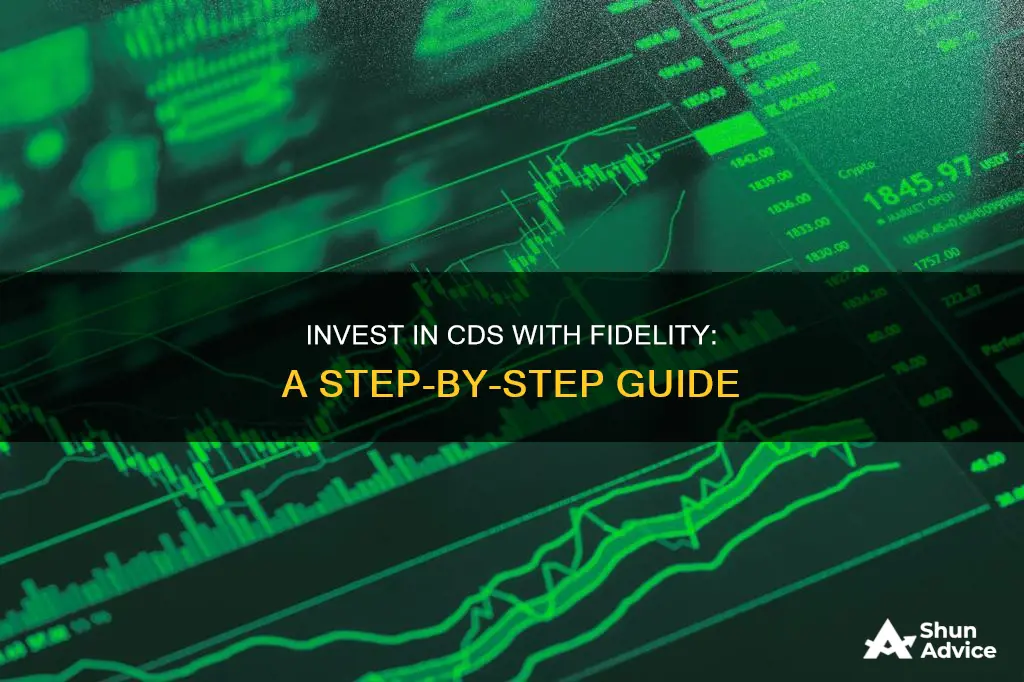
Investing in certificates of deposit (CDs) with Fidelity is a great way to guarantee a certain return on your investment. Fidelity offers brokered CDs, which function similarly to traditional bank CDs. Brokers purchase bank CDs in large denominations and then resell them to customers in smaller denominations. Fidelity offers two types of CDs: standard new-issue CDs and fractional CDs, with varying terms and competitive rates. It's important to understand the potential risks, such as daily fluctuations in interest rates, before investing. You can buy CDs in your IRA or with a Cash Management Account or brokerage account.
| Characteristics | Values |
|---|---|
| How to buy a CD with Fidelity | Click on “News & Research” and then “Fixed Income, Bonds & CDs” after logging in to your Fidelity account |
| CD types | Standard new issue CDs and fractional CDs |
| CD rates | Competitive with some of the best CDs, but it's important to understand how they work and their potential risks before you open one |
| New Issue CD Key Features | Sold in $1,000 increments; no trading fee to purchase; no early withdrawal penalty; sell the CD on the broker's secondary market with a fee of $1 per CD |
| Fractional CD Key Features | Lower minimums of $100; no fee to purchase; same trading fee and potential risks as new issue CDs; depends on whether there are investors interested in buying it |
| Pros | Competitive rates; variety of terms; guaranteed |
| Cons | Potentially better rates elsewhere; minimum deposit; have to go in $1k increments |
| How to open a Fidelity CD account | Open a Fidelity brokerage account online through the broker's website; provide basic information including name, date of birth, Social Security number, and employment information |
| Are Fidelity CDs FDIC-insured? | Yes |
| How to avoid FDIC coverage limitations | Buy through a brokerage |
What You'll Learn

The pros and cons of buying CDs directly from Fidelity
Fidelity offers brokered certificates of deposit (CDs), which are similar to traditional bank CDs. Brokered CDs are purchased by brokers from banks and then resold to customers. This allows consumers to open CDs with several banks at once, all through one point of contact.
Pros
- Competitive rates: Brokered CDs typically have higher interest rates than traditional CDs, and some of Fidelity's CD rates rival the best CD rates on the market.
- No early withdrawal penalties: You can sell your CDs at any time, and there are no early withdrawal penalties.
- Auto-roll feature: You can choose to automatically invest in a new CD at maturity, along with the interest you earned.
- Variety of terms: You can find several term lengths among Fidelity CDs, from three months to 20 years.
- FDIC-insured: Your investment is technically an obligation of the issuing banks and is, therefore, FDIC-insured.
- More than $250,000 in FDIC coverage: Because Fidelity purchases CDs from various issuing banks, you may be able to get more than the standard limit of $250,000 in FDIC coverage per account owner.
Cons
- Interest does not compound: Unlike traditional CDs, brokered CDs do not compound interest.
- Must have an existing Fidelity brokerage or retirement account: To get a CD from Fidelity, you must already have a brokerage or retirement account with the company.
- May lose money if sold before maturity: If you sell your CD before maturity, you may lose money as your CD may be worth less than its original value on the secondary market.
- Potentially better rates elsewhere: While Fidelity's rates are competitive, you may be able to find higher rates by shopping around and comparing rates from other financial institutions.
- Minimum deposit: In some cases, you may have to make a minimum deposit of up to $1,000.
A Guide to Investing in Fixed Income Funds
You may want to see also

How to buy CDs on Fidelity
To buy CDs on Fidelity, you need to have a brokerage account. There are two types of CDs offered by Fidelity: standard new-issue CDs and fractional CDs. The minimum investment for the former is $1,000, and you have to purchase them in $1,000 increments. Fractional CDs, on the other hand, have a minimum investment of $100.
- Log in to your Fidelity account.
- Click on "News & Research" and then "Fixed Income, Bonds & CDs".
- You will be directed to the bond yields page. Here, you can compare different CD options and rates.
- Decide on the term length you want for your CD. Fidelity offers a variety of term lengths, but they are limited to five years.
- Compare the rates offered by banks and credit unions for the term length you desire. You can use DepositAccounts.com to find the best rates.
- Consider the advantages and disadvantages of brokered CDs versus buying directly from a bank or credit union. Brokered CDs offer convenience, but you may have to compromise on yield and early withdrawal options.
- Decide whether you want to buy a new-issue or secondary market brokered CD. New-issue CDs are purchased directly from the bank through the broker, while secondary market CDs are purchased from a previous owner through a dealer.
- If you choose a new-issue CD, pay attention to whether the rate is fixed or variable. A fixed rate means the interest rate will remain the same throughout the term, while a variable rate can change.
- When purchasing a secondary market CD, consider the price, which may be above or below the face value, and the commission charged by the broker, typically $1 per $1,000 in face value.
- Decide on the amount you want to invest, keeping in mind the minimum investment requirements for new-issue and fractional CDs.
- Follow the instructions on the Fidelity platform to complete the purchase of your chosen CD.
Remember that interest rates on brokered CDs can fluctuate daily, affecting the resale value of your CD on the secondary market. Additionally, while there is no early withdrawal penalty with Fidelity CDs, selling before maturity may result in getting less than your original investment.
Best College Funds: Where to Invest for Your Child's Future
You may want to see also

Fidelity's two types of CDs
Fidelity offers two types of certificates of deposit (CDs): standard new-issue CDs and fractional CDs. These brokered CDs are purchased by brokers in large denominations from banks and then resold to customers in smaller denominations.
Standard New-Issue CDs
Standard new-issue CDs are sold in $1,000 increments, meaning if you want to invest $10,000, you would need to buy 10 CDs. There is no trading fee to purchase these CDs, and you can also buy prepackaged CD ladders with varying terms. Typically, there are 50 to 100 new-issue offerings available at any given time.
There is no early withdrawal penalty with these CDs; instead, you can sell them on the broker's secondary market. However, there is a fee of $1 per CD for doing so. As interest rates on brokered CDs can change daily, your CD might be worth less than its original value on the secondary market, and you may get less than your initial investment if you decide to sell.
Fractional CDs
Fractional CDs have lower minimum investments than standard new-issue CDs, with each CD starting at $100. The interest rates are a little different, and the term options are more limited. There is no fee to purchase fractional CDs, and the same trading fee and potential risks apply if you decide to sell.
Because you can only sell your CD on the secondary market if there are investors interested in buying it, there is no guarantee you will be able to sell when you want. This increases the liquidity risk compared to a bank CD.
Launching a Hedge Fund: A Teen's Guide to Investing
You may want to see also

How to open a Fidelity CD account
To open a Fidelity CD account, you must first have a brokerage account with the broker. You can open a Fidelity brokerage account online through the broker's website. You will need to provide some basic information about yourself, including your name, date of birth, Social Security number, and employment information. If you want to transfer funds from your bank or another brokerage account to your new Fidelity account, you can do so during the account opening process.
Fidelity offers two types of CDs: standard new-issue CDs and fractional CDs. New-issue CDs are sold in $1,000 increments, so if you want to invest $10,000, for example, you would need to buy 10 CDs. Fractional CDs, on the other hand, have a minimum investment of just $100, offering more flexibility.
It's important to understand the potential risks and limitations of Fidelity CDs before investing. While they are safe investments that can guarantee a certain return, there may be liquidity issues when it comes to selling your CD on the secondary market. Additionally, interest rates on brokered CDs can fluctuate daily, which could impact the value of your investment.
Venture into Janus: Diversified Investment, Smart Returns
You may want to see also

Are Fidelity CD rates competitive?
Fidelity CD rates are considered competitive when compared to the top CD rates from traditional banks and credit unions. However, it is always recommended to shop around and compare rates before investing in a brokered CD with Fidelity or any other financial institution.
Fidelity offers brokered certificates of deposit (CDs), which are similar to traditional bank CDs but with some key differences. Brokers purchase CDs from banks in large denominations and then resell them to their customers in smaller amounts. This allows consumers to open CDs with multiple banks simultaneously while dealing with just one contact at Fidelity.
Fidelity's CD terms range from three months to twenty years, with annual percentage yields (APYs) of up to 4.50%. The company offers two types of CDs: standard new-issue CDs and fractional CDs. The minimum investment for new-issue CDs is $1,000, and they are sold in $1,000 increments. Fractional CDs, on the other hand, have a lower minimum investment of $100.
It is important to note that brokered CD rates can fluctuate daily, and there is a possibility of losing money if you sell your CD before maturity. Additionally, brokered CDs do not offer compound interest like traditional bank CDs.
Investment Advisor or Hedge Fund: What's the Difference?
You may want to see also
Frequently asked questions
The pros include guaranteed returns, competitive rates, and a variety of terms. The cons include a minimum deposit of $1,000 for new issue CDs and the potential for better rates elsewhere.
You can open a Fidelity brokerage account online through the broker's website. You'll need to provide basic information, including your name, date of birth, Social Security number, and employment information. You can also transfer funds from your bank or another brokerage account during the account opening process.
Yes, Fidelity CDs are FDIC-insured because the company buys large-denomination CDs from banks, making your investment an obligation of the issuing banks.
For standard new issue CDs, the minimum investment is $1,000, and you must purchase CDs in $1,000 increments. If you want more flexibility, you can opt for a fractional CD, which has a minimum investment of $100.
Once you have a Fidelity brokerage account, log in and click on "News & Research", then "Fixed Income, Bonds & CDs". From there, you can view the available CDs and select the one you want to purchase.







